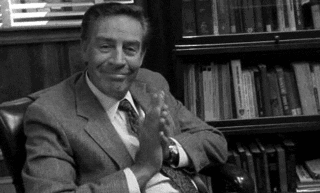Article: Byron Sharp-The Dark Lord…
Angry since 2012
Byron Sharp has been publicly spewing criticism since 2012. He has tactically criticised loyalty, segmentation, and differentiation in interviews with foreign media.
When MarketingWeek's Mark Ritson called him "The Dark Lord Of Penetration," Byron Sharp must have been rubbing his hands in glee.
Byron Sharp must have been rubbing
his hands in glee
Friction on the internet is like pouring gasoline on a fire. 🔥 Sharp has made controversial statements, such as claiming that brand loyalty is wishful thinking, segmentation is silly, and differentiation is just a waste of time and money. He's quarreled with many professions over the years, almost the entire industry, as he criticizes sixty years of marketing research.
Byron Sharp has stirred anger in Sweden
In interviews, everyone gets a jab, from loyalty specialists to designers. He has stirred anger in Sweden, with Per Robert Öhlin expressing clear disapproval in Resumé, stating that Byron Sharp seems to have a hole in his prefrontal cortex. Sensational headlines generate traffic and spread, which has benefited Byron Sharp. In ten years, he has gone from an unknown professor in Australia to an internationally best-selling author.
A different tone at home
Sharp's statements have been tactically spiced, confirmed in an interview with Jon Evans on the popular podcast "The Uncensored CMO." Here, Sharp explains in a balanced tone that loyal customers do exist, but they are the exception.
“I’m not against segmentation, it’s a misunderstanding”
The rule, instead, is that most customers buy from the same brand occasionally. He laments that his view on segmentation is misunderstood; he is not against all segmentation, especially not demographic segmentation. Sharp gently points out that his book is titled “How Brands Grow,” not “How To Grow Brands,” which would be prescriptive, according to him.
Jonathan Ive!
In the same podcast, Sharp praises Apple's skill in appearing interesting and relevant, even commending designer Jonathan Ive! In Sharp's world, he calls it distinctive and memorable design rather than differentiation, and he supports distinctive design. Byron Sharp comes across as a nuanced academic, a perception shared by many in his homeland. Here, Sharp's theories are often a starting point rather than a dividing line. To understand why one must know that Sharp is more than just one person.
Employed at EBI
Sharp is a professor employed at what is colloquially known as EBI, the Ehrenberg-Bass Institute. EBI is part of the University of South Australia, located in Adelaide. Byron Sharp became internationally known when his book "How Brands Grow" was published, but the ideas were neither new nor his own. The book is based on studies conducted by EBI's founder, Andrew Ehrenberg, during the 1960s. EBI's primary purpose is to conduct empirical research to benefit its sponsors. The sponsors vary, but in recent years they have included Unilever, Lindt, and Mars. "How Brands Grow" was written as a handbook for EBI's sponsors, not as a bestselling marketing book. On the EBI website, Unilever's marketing manager describes the collaboration with the institute as so close that all employees know what EBI terms like mental and physical availability mean. With the major media buyers' preference for EBI, they are deeply rooted and well-established in Australia, and many in the industry have met Byron Sharp. In the last question of the podcast interview, a listener wonders if EBI will open up to non-sponsors. The answer is that EBI is actually considering such a solution. If the institute opens its doors and more people gain access to Sharp's and EBI's research, a different image of Byron Sharp would likely emerge, one that more closely resembles his image at home. The question is whether he needs to change his image. For who sells more books, a reasonable academic or a hot-headed disruptor?

